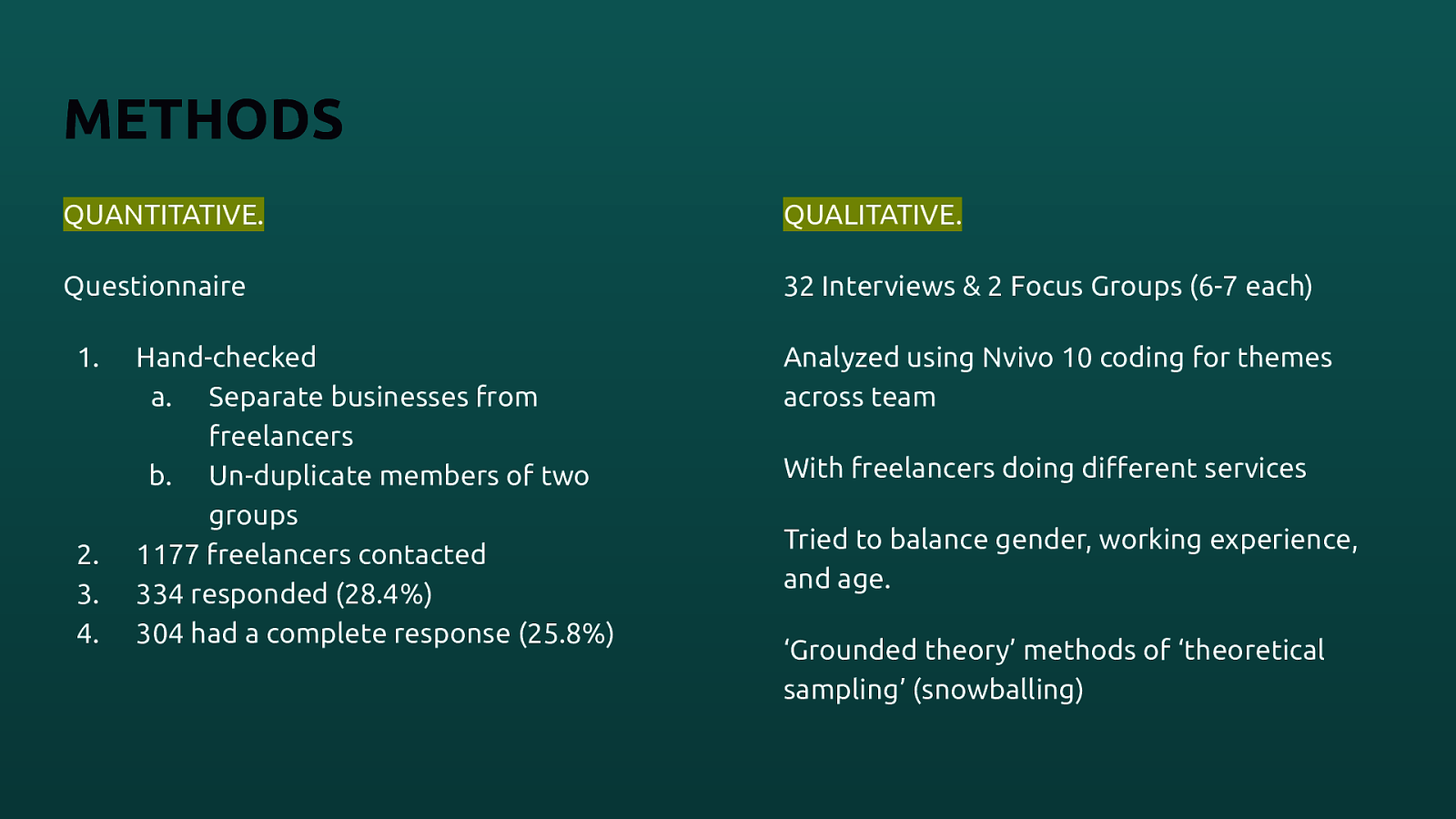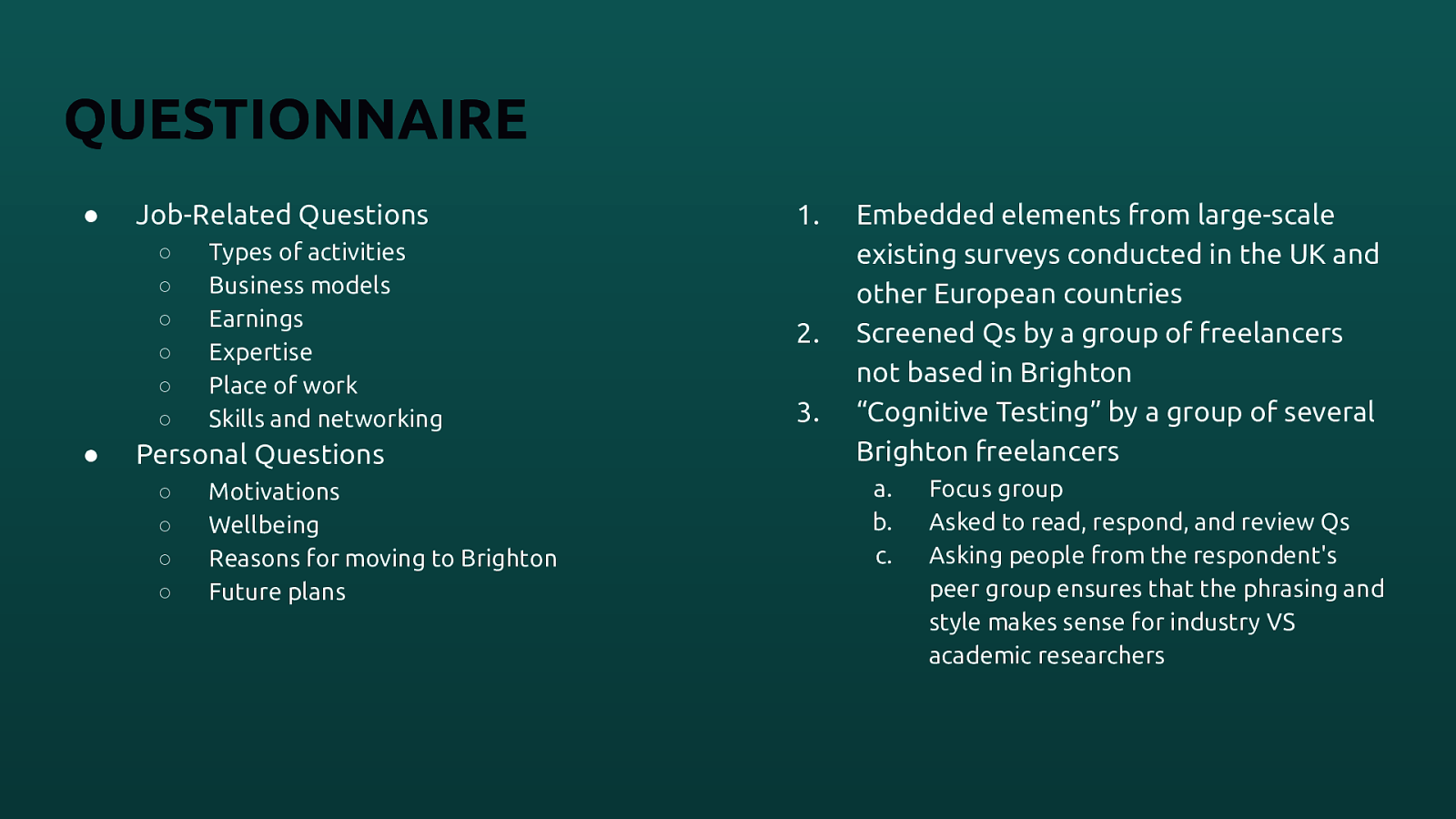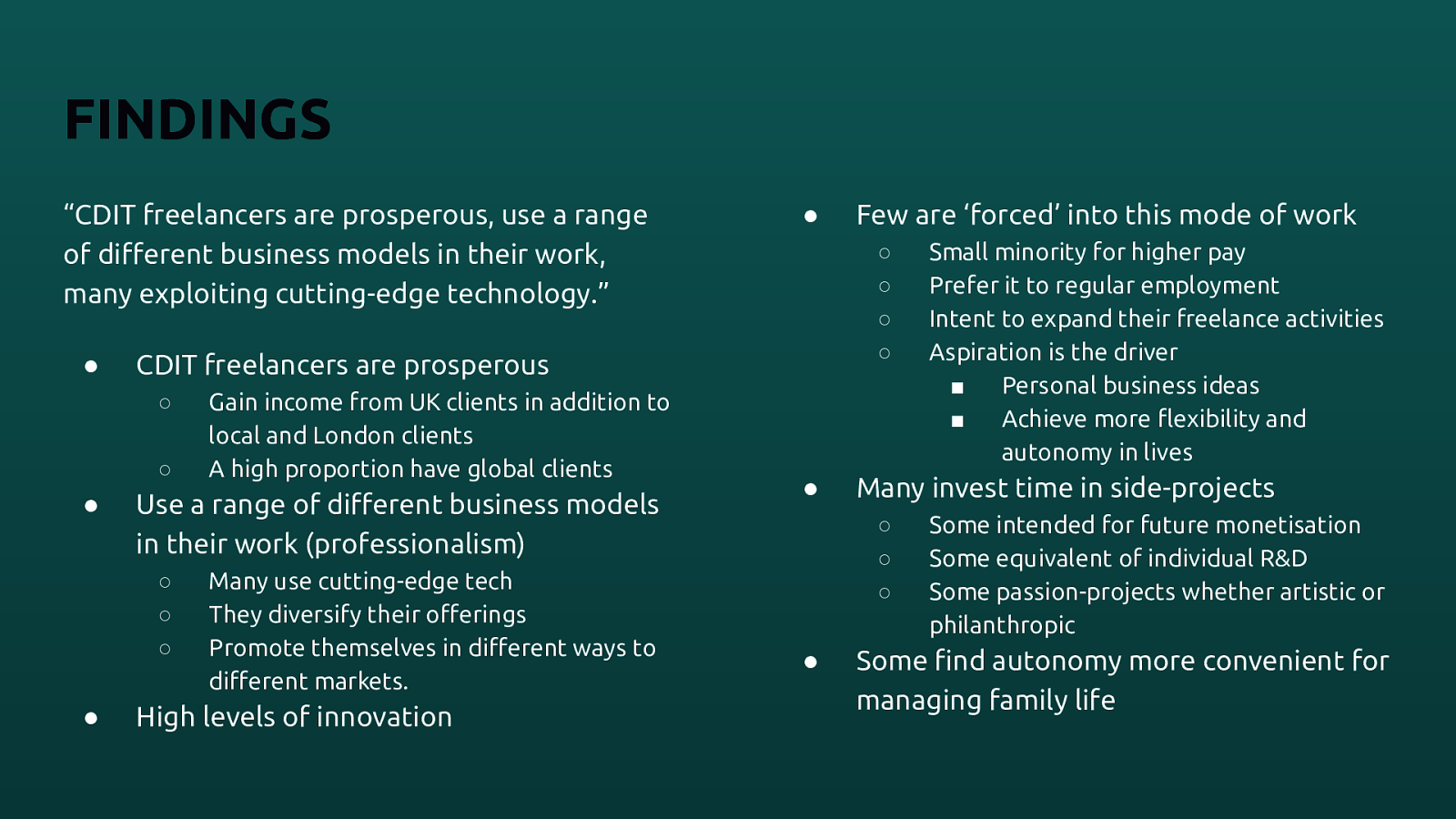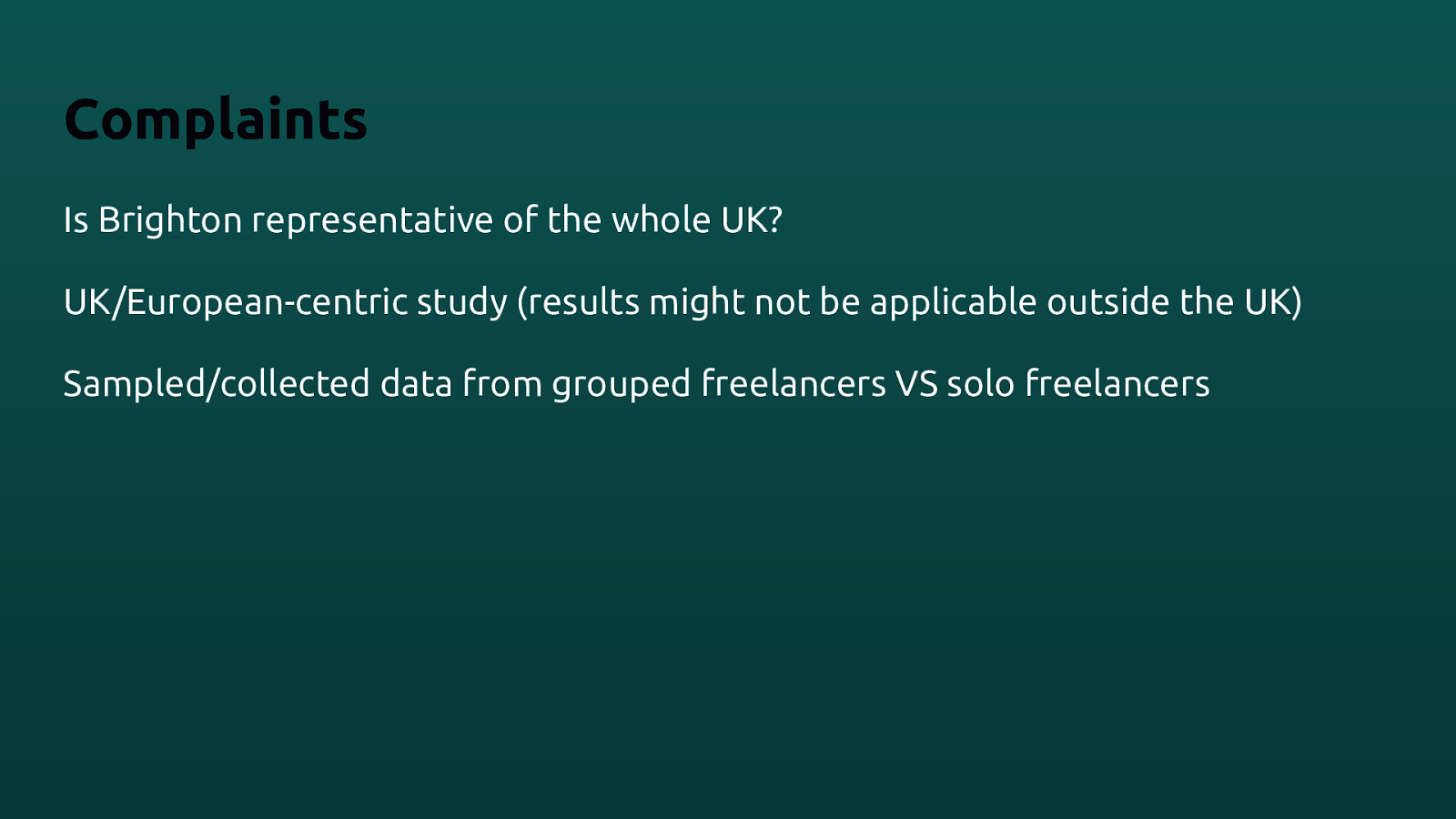Freelancers in Brighton, UK Craig Bossley
A presentation at Industry Research: Planning and Methods in April 2019 in Tainan City, Taiwan by Craig Bossley

Freelancers in Brighton, UK Craig Bossley

WHO This was a collaborative R&D study by a Professor at University of Brighton and a Professor from University of Sussex with Wired Sussex (independent, non-profit CDIT membership organization). Published in January 2015. Following the first report in 2013. The Fuse Report (2010) Brighton Fuse Report (2013) Brighton Fuse 2 Report (2015)

CONTEXT (1) The first report examined the Creative-Digital-IT (CDIT) industries in Brighton. “Average firms worked with more than 7 freelancers, and coincidentally had 7 employees. Almost 80% of firms in the sample worked with freelancers.” ● ● ● ● Managers referred to services and supplementary skills provided, Content companies crowdsource ideas from freelancers, Digital agencies contract them to manage projects Marketing firms depend on scarce know-how, i.e. paid search in e-business “It was clear that these temporary workers delivered great value, yet it was value that was under the radar.”

CONTEXT (2) The recession and subsequent recovery led to growth in self-employment. The UK Institute of Public Policy Research found self-employment growth in the UK higher than any other European country (traditionally not had much) Bank of England Monetary Policy Committee, Trades Union Commission (TUC), and politicians have mixed views. (long-term secular trend VS cyclical response) Policy Arena | it’s an “economic illusion” of displaced employment (residual after essential workforce identified) - They’re just keeping up appearance with odd jobs - Struggling by -Would prefer the securities of a “real” job

CONTEXT (3) Policy & academic literature give “mixed evidence, and often with an underlying tone of gloom” ‘True’ versus ‘false’/’forced’ freelancers ● ● ● No positive connotations to their status Lack marketing and commercial skills Success depends on clients ○ ● Viewed suspiciously and distant relations ○ ● “Whatever it took” Even when info needed Loneliness of solitary freelance work Negative status, prosperity, and wellbeing. Positive for individuals ● ‘Portfolio’ and ‘boundaryless career’ ● Gain life satisfaction from autonomy ● Encouraged innovation ● Hired to do the most creative tasks ● Create employment and economic growth through providing services that bring businesses success throughout the economy However… ● Freelancers work across industries ● Many based on small samples in specific industries ● Many don’t address the effect of digitalization

METHODS QUANTITATIVE. QUALITATIVE. Questionnaire 32 Interviews & 2 Focus Groups (6-7 each) 1. 2. 3. 4. Hand-checked a. Separate businesses from freelancers b. Un-duplicate members of two groups 1177 freelancers contacted 334 responded (28.4%) 304 had a complete response (25.8%) Analyzed using Nvivo 10 coding for themes across team With freelancers doing different services Tried to balance gender, working experience, and age. ‘Grounded theory’ methods of ‘theoretical sampling’ (snowballing)

SAMPLE No official registry… 4 different pools of grouping people July-September 2014 (Artists, designers, programmers, and business managers) Because “high-growth sectors tend to organize in specific places” “coworking space” “networking group for web designers and developers” “group of freelancers working as illustrators” “Brighton CDIT membership association and partner of the Fuse projects”

QUESTIONNAIRE ● Job-Related Questions ○ ○ ○ ○ ○ ○ ● Types of activities Business models Earnings Expertise Place of work Skills and networking Personal Questions ○ ○ ○ ○ Motivations Wellbeing Reasons for moving to Brighton Future plans 1. 2. 3. Embedded elements from large-scale existing surveys conducted in the UK and other European countries Screened Qs by a group of freelancers not based in Brighton “Cognitive Testing” by a group of several Brighton freelancers a. b. c. Focus group Asked to read, respond, and review Qs Asking people from the respondent’s peer group ensures that the phrasing and style makes sense for industry VS academic researchers

What is a “freelancer”? No unique or absolute definition in the UK. Can work under different legal forms that often come from suggestions by an accountant/client rather than economic activity. Called different things by different people: contractors, developers, consultants, commissioned, independent professionals, creatives. Followed the Labour Force Survey (LFS) which mixes legal forms like “sole trader” and non legal entities like “working for yourself” Used by the Association of Independent Professionals and the Self-Employed (IPSE) and other academic scholars.

FINDINGS “CDIT freelancers are prosperous, use a range of different business models in their work, many exploiting cutting-edge technology.” ● ○ Use a range of different business models in their work (professionalism) ○ ○ ○ ● Gain income from UK clients in addition to local and London clients A high proportion have global clients Many use cutting-edge tech They diversify their offerings Promote themselves in different ways to different markets. High levels of innovation Few are ‘forced’ into this mode of work ○ ○ ○ ○ CDIT freelancers are prosperous ○ ● ● ● Many invest time in side-projects ○ ○ ○ ● Small minority for higher pay Prefer it to regular employment Intent to expand their freelance activities Aspiration is the driver ■ Personal business ideas ■ Achieve more flexibility and autonomy in lives Some intended for future monetisation Some equivalent of individual R&D Some passion-projects whether artistic or philanthropic Some find autonomy more convenient for managing family life

Complaints Is Brighton representative of the whole UK? UK/European-centric study (results might not be applicable outside the UK) Sampled/collected data from grouped freelancers VS solo freelancers